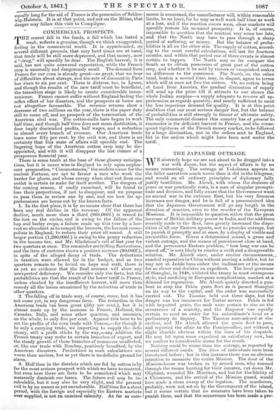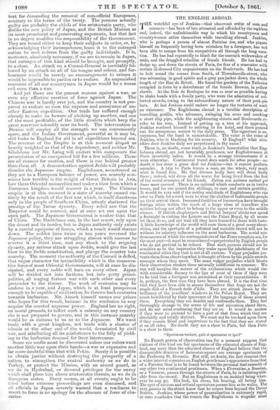THE JAPANESE OUTRAGE.
WE sincerely hope we are not about to be dragged into a war with Japan, but the aspect of affairs is by no means reassuring. The outrage at Yokohama appears in the fuller narratives much worse than it did in the telegram, and would on all ordinary principles of diplomacy fully justify hostilities. Mr. Alcock, with whom the decision of peace or war practically rests, is a man of singular prompti- tude and decision, and fully aware that the Government want no second war in the extreme East, but his very firmness increases our danger, and he is full of a preconceived idea that the Japanese Government will go any length in the direction of reaction, even to the murder of the European Missions. It is impossible to question either that the great increase of British military power in India, and the additions recently made to the fleet, have greatly increased the dispo- sition of all our Eastern agents, not to provoke outrage, but to punish it promptly and at once, by a display of visible and irresistible force. Given a determined consul, a gross and violent outrage, and the means of punishment close at hand, and the permanent Eastern problem, " how long war can be staved off," is very likely to receive a swift and a disagreeable solution. Mr. Alcock once, under similar circumstances,. exacted reparation in China without moving a soldier, but lie may not at Jeddo have either the inclination or the means for so clever and decisive an expedient. The local governor of Shanghai, in 1848, violated the treaty in most outrageous style, and confiding in European complications, mocked at a demand for reparation. Mr. Alcock quietly directed a gun- boat to stop the Pekin grain fleet as it passed Shanghai on its way to the capital, and the order was successfully carried out. The Taoutae held out three days, but the danger was too imminent for Tartar nerves. Pekin is fed with imported grain, the mob were certain to rise on the occurrence of a scarcity, and the Emperor was equally certain to send an order for his subordinate's head as a preliminary to inquiry. The Taoutao surrendered at dis- cretion, and Mr. Alcock allowed the grain fleet to pass, and reported the affair to the Foreign-office, not without a slight chuckle obvious within the lines of his despatch. He may hit upon some expedient as satisfactory now, but we confess to considerable alarm for the result.
Nothing could be worse than the outrage, as reported by several different hands. The lives of individuals have been threatened before ; but in this instance there was an obvious intention to massacre the entire Mission. The door of the Mission-house was broken in by armed men, who roamed through the rooms hunting for their inmates, cut down Mr. Oliphant, wounded Mr. Morrison, and but for the fidelity of a Chinaman, and the arrival of the Mission guard, would have made a clean sweep of the legation. The murderers, probably, were not set on by the Government of the island, but it seems certain that no measures have been taken to punish them, and that the occurrence has been made a pre-
text for demanding the removal of non-official Europeans, contrary to the terms of the treaty. The persons actually guilty are probably the chiefs of the aristocratic party, who dislike the new policy of Japan, and the British Mission as its most prominent and persevering exponents, but that fact in no degree modifies the responsibility of the Government. They are bound either to keep their subjects in order, or, by acknowledging their incompetence, leave it to the outraged nation to seek redress from the guilty individuals. It is, moreover, absolutely necessary, if we are to remain in Japan, that outrages of this kind should be brought, and promptly, to a close. An attack on a Consul-General is inevitably fol- lowed by an attack on all of his tongue and colour, and for- bearance would be merely an encouragement to crimes it would be impossible to pardon or to endure. An unpunished massacre of all our countrymen in Japan would be a worse evil even than a war.
And yet there are the gravest reasons against a war, or even any effective exertion of force against Japan. The Chinese war is hardly over yet, and the country is not pre- pared to endure so soon the expense and annoyance of an- other Eastern expedition. Our trade has suffered enough .already to make us beware of choking up another, and one of the most profitable, of the little rivulets which keep the great reservoir tolerably near its level. The intervention in Mexico will employ all the strength we can conveniently spare, and the Indian Government, powerful as it may be, still looks to England for aid in all expeditions beyond sea. The revenue of the Empire is at this moment alinpst as heavily weighted as that of the dependency, and neither Mr. Gladstone nor Mr. Laing will endure with composure the presentation of an unexpected bill for a few millions. These are all reasons for caution, and there is one behind greater than them all. A demonstration against Jeddo will probably dissolve the Japanese empire. Englishmen, accustomed as they are to a European balance of power, are scarcely con- scious how terrible is the weight of Great Britain in Asia, how these Oriental monarchies reel under a blow from which a European kingdom would recover in a year. The Chinese empire is at this moment in a state of anarchy caused en- tirely by the result of the first war, which, in itself disastrous only to the people of Southern China, utterly shattered the prestige of the Tartar dynasty. Every rebel saw that the Emperor could be coerced, and at once set out upon the open path. The Japanese Government is weaker than that of China. The Mantchoos can, in the last resort, rely upon the desert and its hordes, but in Japan authority only exists by a careful equipoise of forces, which a touch would shatter down. The nobles have twice in ten years reversed the Japanese policy, they are struggling almost with success to reverse it a third time, and any shock to the reigning dynasty, any serious attack upon Jeddo, would give the last blow to the feeble constitution, and plunge the country into anarchy. The moment the authority of the Council is defied, that vague character for invincibility which is the conserva- tive force of most Oriental Governments, will at once be dis- sipated, and every noble will turn on every other. Japan will be divided not into factions, but into petty princi- palities, all waging furious war with each other and every pretender to the throne. The work of centuries may be undone in a year, and Japan, which is at least prosperous enough to be capable of civilization, be thrown back centuries towards barbarism. Mr. Alcock himself names one prince who hopes for this result, because in the confusion he may acquire the coveted supreme power. England has no right, on moral grounds, to inflict such a calamity on any country she is not prepared to govern, and in this instance anarchy would be as ruinous to us as to the Japanese. We want trade with a great kingdom, not trade with a cluster of islands at the other end of the world, devastated by civil war, and attributing all its misfortunes to the folly of yield- ing to the barbarian demand for freer intercourse. Some via media must be discovered unless our rulers want another little war upon their hands—a war as expensive and far more doubtful than that with Pekin. Surely it is possible to obtain justice without destroying the prosperity of a nation, to strengthen the central authority as we do in Turkey, or protect the Mission, with an armed guard, as we do in Hydrabad, or demand privileges for the envoy which shall place him above aristocratic threats, as we do in European states. Every means, at all events, ought to be tried before extreme proceedings are even discussed, and all officials in Japan severely warned that a readiness to resort to force is no apology for the absence of force of cha- racter.































 Previous page
Previous page